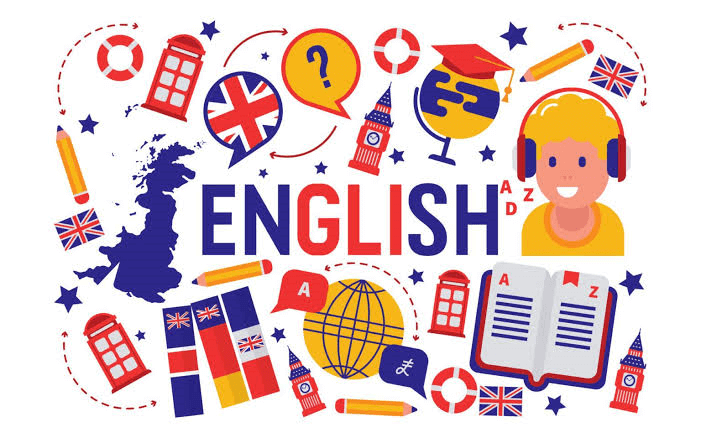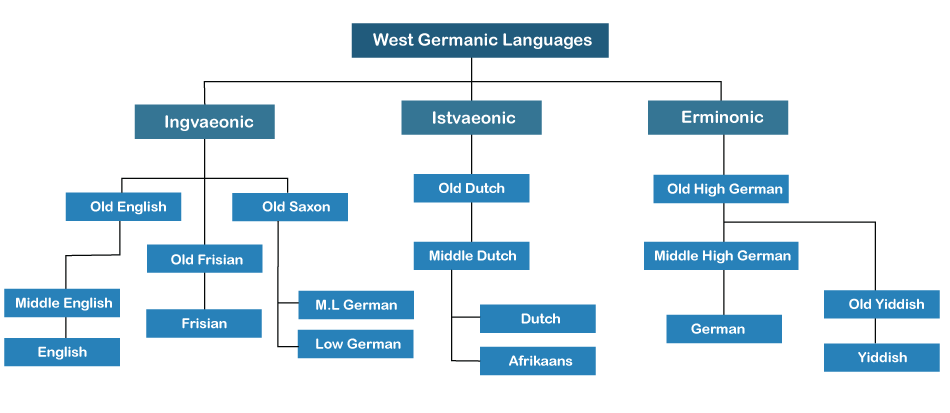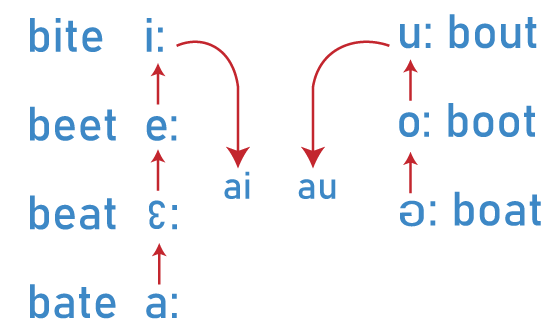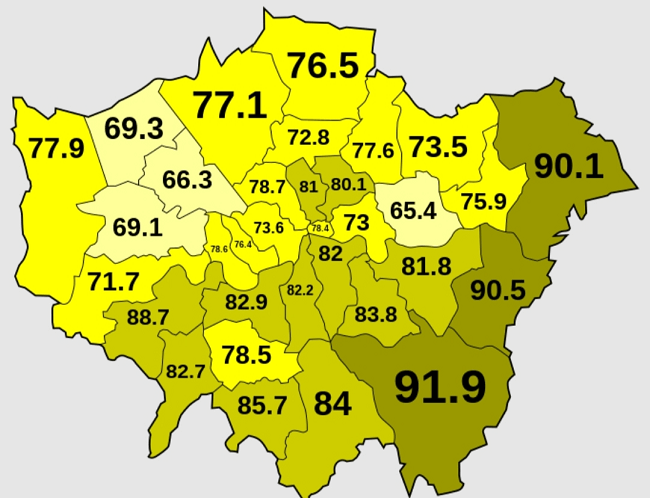English DefinitionEnglish is the West Germanic language in the Indo-European language family which was spoken in its earliest forms by the inhabitants of early medieval England. It has named after the Angles, a group of ancient Germanic people in Great Britain. English is genetically Germanic, sharing a dialect continuum with Scots and being most closely related to Low German and Frisian. Nonetheless, its vocabulary demonstrates strong influences from French and Latin (28% of Modern English words on average), as well as some Old Norse grammar and a very small amount of core vocabulary (a North Germanic language). Those who speak English are called anglophones. 
Several North Sea Germanic dialects were brought to Great Britain in the 5th century by Anglo-Saxon settlers, and these dialects were further modified by Norse-speaking Viking settlers in the 8th and 9th centuries to frame the oldest forms of English, also known as "Old English." During the Norman conquest of England 11th century, a large quantity of Old French (particularly Old Norman French) and Latin-derived terminology was integrated into English over the period of three centuries. The arrival of the printing press in London in the late 15th century marked the beginning of early Modern English, the Great Vowel Shift, and also the Renaissance trend of even more introducing Latin and Greek terms and roots into English. The King James Bible and William Shakespeare's writings marked the notable culmination of this period. The traditional Indo-European dependant marking pattern with its rich inflectional morphology and relatively free word order gave way to a primarily analytic pattern with hardly any inflection and a fairly fixed subject-verb-object word order in the evolution of modern English grammar. 
In addition to passive constructions, interrogatives, and some negation, modern English increasingly utilizes auxiliary verbs and word formation to express complex tenses, aspects, and moods. Since the 17th century, the British Empire and the United States of America have contributed to the global development of modern English. In these nations, English has taken over as the dominant language of written and electronic communication and the lingua franca in numerous fields as well as professional situations, including science, navigation, and law. English is the third most widely spoken native language in the world, after Standard Chinese and Spanish. English is the most widely taught as a second language and used as the official language or one of the official languages in 59 sovereign states. More people than native speakers use English as a second language. In 2005, it was estimated that there were more than 2 billion English speakers. English is widely spoken in most of Africa, the Caribbean, Southeast Asia, South Asia, and Oceania. It is the majority-native language of the Republic of Ireland, Canada, the United States, Australia, and New Zealand. The European Union, the United Nations, and numerous other global and regional institutions all recognize English as a co-official language. English is spoken by at least 70% of individuals who speak Germanic, an Indo-European language. History of EnglishThe earliest known form of English is named Old English, also termed as lo-Saxon (about 550-1066). A few minor inscriptions from the early stage of Old English were written in a runic script. The Anglo-Saxons settled in Britain in the 5thcentury as the Roman administration and economy began to fall apart. By the 7th century, Common Brittonic, a Celtic language, and Latin, which had been introduced to Britain by the Roman Empire, had been replaced by the Germanic language of the Anglo-Saxons (43-409). The Angles are the origin of England and English, which were formerly called Ænglaland and Ænglisc. Anglian dialects, Kentish dialects, Saxon dialects, and West Saxon dialects were the four subdialects of Old English. Due to King Alfred's educational reforms and the Wessex kingdom's influence in the 9th century, the West Saxon dialect was accepted as the written form of the language. The earliest English poem, Caedmon's Hymn, is written in Northumbrian, whereas the epic poem Beowulf is written in West Saxon. While the Scots language developed from Northumbrian, the contemporary English language largely derived from Mercian. A small number of early Old English inscriptions were written in a runic script. Around the 6th century, a Latin alphabet with half-uncial letters was adopted. It had the modified Latin letters eth ⟨ð⟩, and ash ⟨æ⟩.as well as the runic letters wynn ⟨?⟩ and thorn ⟨þ⟩. 
For unstudied English speakers in the 21st century, Old English is practically a separate language from Modern English which is nearly impossible to understand. Similar to current German, its grammar included many more inflectional endings and forms for nouns, adjectives, pronouns, and verbs than those found in Modern English including the word order. Old English also featured case endings in nouns and more personal as well as number endings in verbs than modern English, which has case forms in pronouns (he, his, his) and some verb inflections (speak, speaks, speaking, spoke, spoken). Old Frisian is the closest relative, but even centuries after Anglo-Saxon migration, Old English and other Germanic kinds remained as considerable. Historical evidence suggests that Old Norse and Old English maintained a large degree of mutual intelligibility even during the Danelaw and later Viking invasions as in the 9th and 10th centuries. A commoner from England and a commoner from Scandinavia could communicate as late as the 900s century AD. The numerous tribes of people who lived in England and Scandinavia and their interactions with one another are still being thoroughly researched. Middle EnglishFirst, the waves of Norse colonization of the northern British Isles in the 8th and 9th centuries brought Old English into direct contact with Old Norse, a North Germanic language. Norse colonization took place mostly in the northern Old English dialects spoken in the Danelaw region around York these features can still be seen in Scots and Northern English today. Yet, it appears that Lindsey and the surrounding area in the Midlands were the centers of norsified English. Without having any direct interaction with Norwegian speakers, Norse components spread into English types around 920 CE, when Lindsey was reintegrated into the Anglo-Saxon kingdom. The group of pronouns that start with th- (they, them, they're) that replaced the Anglo-Saxon pronouns start with h-(hie, him, hera) is an example of Norse influence that can be found in all English variations today. Old French, namely the Old Norman dialect, comes into touch with the now-norsified Old English with the Norman invasion of England in 1066. In England, the Norman language evolved into Anglo-Norman. The introduction of numerous loanwords associated with politics, law, and high social spheres was Norman's biggest contribution, while the lower classes continued to speak Anglo-Saxon (English) and the elites and nobles continued to use Norman. Middle English also substantially simplified the inflectional system, most likely reconciling the inflectionally diverse but morphologically comparable Old Norse and Old English. Spread of Modern EnglishEnglish had been widely used by the British Empire's colonies by the late 18th century, and it had grown to be the dominant language in the world. Trade, science and technology, art, diplomacy, and formal education have all contributed to English becoming the world's most widely spoken language. On a worldwide scale, English encouraged international communication. England went on to build more colonies, which eventually improved their grammar and style of writing. In addition to other places, English has been widely spoken in North America, Australia, and Africa. To avoid the political and other difficulties that come with favoring one indigenous language over the others, some recently independent nations with a variety of indigenous languages decided to maintain English as the official language. Due to the United States' rising economic and cultural importance and its standing as a superpower during World War II, the language spread quickly throughout the world in the 20th century along with international transmission in English by the BBC and other broadcasters. English is the language being spoken and written mostly in the 21st century. 
When Modern English developed, explicit guidelines for acceptable usage were written and disseminated through official channels including public education and state-run newspapers. Samuel Johnson's 'A Dictionary of the English Language' which was published in 1755 introduced standard spellings of words and usage norms. To establish a standard for American English that differs from the British norm for both spoken and written communication, Noah Webster released the 'American Dictionary of English Language' in 1828. The stigmatization of non-standard or lower-class dialect characteristics led to a rapid rise in prestige variances among the middle classes in Britain. While the SVO (subject-verb-object) word order is virtually fixed, the grammatical case has almost entirely vanished in modern English. It is now most visible in pronouns like he and him, she and her, and who and whom. Progressive forms ending in -ing are increasingly being used in new constructions, with terms like being built becoming more common. Together with the gradual regularisation of irregular forms (e.g., dreamed rather than dreamt), analytical alternatives to inflectional forms are expanding commonly (e.g. more polite instead of politer). English as Global LanguageBecause only people of English ethnicity speak it, English is no longer considered to be an "English language." English is increasingly being used for both domestic and international communication. Many people study English for practical purposes than for ideological ones. An "Afro-Saxon" language group that unites Africans from various nations now includes many African English speakers. Former colonies did not necessarily reject English during the British Empire's decolonization in the 1950s and 1960s rather, they kept using it as independent nations with their national language policy. For instance, English is still the official language of India, even though many Indians today equate it with economic prosperity rather than colonialism. India reports the third-highest volume of English-language novels worldwide, after the United States the and United Kingdom. English is also commonly utilized in media and literature. Even with this, less than 5% of people in India speak English fluently, and it is rarely used as a first language. Just a small number of individuals speak it fluently. The number of English speakers in India is still unknown, with the majority of experts concluding that the United States continues to have greater English speakers than India, despite David Crystal's claim that India currently has more individuals who speak or understand English than any other nation in the world in 2004. 
Modern English is usually regarded as the first world language since it served as the first lingua franca on a worldwide scale. English is the most widely used language in the world for popular entertainment, diplomacy, international trade, international telecommunications, the printing of books and newspapers, and scientific publications. According to the international convention, English serves as the basis for the two minimum natural languages that are necessary for seafaring and aviation, termed Seaspeak and Airspeak. Dialects and Accents of EnglishThe term "English dialect" refers to a variety of regional varieties that vary in syntax, vocabulary, and pronunciation patterns. Dialects are distinct regional accents based on how specific locations are pronounced. British English (BrE) and North American English (NAE) are the two most important native English dialects, according to linguists (NAE). Southern Hemisphere English is divided into three primary groups, the most well-known of which are Australian and New Zealand English. The following are some of the most well-known English accents and dialects:
British Received Pronunciation (RP): It is distinguished by its lack of regional characteristics and clarity of articulation
Cockney is an English dialect associated with the working-class people of East London. It is distinguished by features like using rhyming slang and the inference of the letter "h" from words.
This is the English dialect spoken in Australia, which has developed its distinctive features, such as the use of a rising inflection at the end of sentences and the pronunciation of certain words, such as "dance" and "castle."
The United States has many different accents of English, including the Southern accent, the Boston accent, and the New York accent. The pronunciation and word usage of these accents differ.
This is the English dialect spoken in Ireland, distinguished by its distinctive pronunciation and use of idiomatic expressions. Writing System of EnglishSince the 9th century, Latin has been used to write English (also called the Roman alphabet). Little inscriptions are all that exist of the early Anglo-Saxon runic texts in Old English. The huge number of Old English literary works that have persisted to the current day is written in the Roman alphabet. The 26 Latin script letters in the modern English alphabet are: a, b, c, d, e, f, g, h, I, j, k, l, m, n, o, p, q, r, s, t, u, v, w, x, y, and z. (which also have capital forms: A, B, C, D, E, F, G, H, I, J, K, L, M, N, O, P, Q, R, S, T, U, V, W, X, Y, Z). French, Roman, and Greek spelling features are added to the underlying Germanic system to create the multi-layered and complex English spelling system. English writing also includes a punctuation mark system that is similar to that used in the majority of alphabetic languages worldwide. Punctuation is used to mark constructive grammatical relationships in sentences to help readers understand a text and to indicate features that are important when reading a text aloud. The ConclusionMillions of people worldwide use the English language as their primary means of communication, and it is a sophisticated and dynamic system. It belongs to the Germanic language family and derives from Old English, which was used in England during the Anglo-Saxon era. English has developed into a global language as a result of the influence of the British Empire as well as the United States of America, and also the extensive use of technology and the internet. Many nations, including the US, UK, Australia, and Canada, have adopted it as their official language. When new words are developed and outdated ones are abandoned, the meaning of the English language is evolving and changing all the time. It is a lively, dynamic language that reflects the variety and cultural wealth of the speakers. English is still a common language for study and communication despite its complexity, and its significance in the international community is not going to fade any time soon.
Next TopicEnvironmental Pollution Definition
|
 For Videos Join Our Youtube Channel: Join Now
For Videos Join Our Youtube Channel: Join Now
Feedback
- Send your Feedback to [email protected]
Help Others, Please Share










